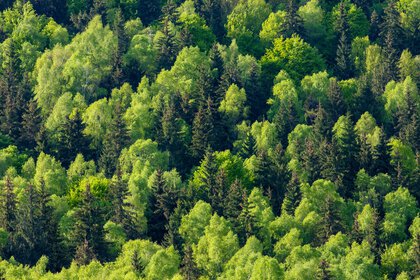Climate protection and climate adaptation as a common goal
Support climate protection with the GoGreen Ticket of automatica!
Climate change is one of the greatest challenges of our time. To limit the global impact, the international community has set itself the goal of keeping global warming to 1.5°C. This is crucial to ensure a livable environment for future generations. Climate protection projects play a central role in this. Likewise, promoting climate adaptation measures is essential to prepare for the already noticeable effects of climate change. By financially supporting projects in both areas, we can all make a small but important contribution.
Commitment to climate protection
As part of our ongoing commitment to sustainability, we have introduced the optional GoGreen Ticket. With a surcharge of €5 gross on the regular ticket price, we enable our visitors and exhibitors to voluntarily support climate projects. This amount does not compensate for the emissions caused by a visit to the trade fair but serves as financial support for climate protection and adaptation measures.
This is how the GoGreen Ticket works
The additional net revenue from the €4.20 surcharge on each ticket goes directly to regional and international climate protection projects that we support together with our partners, the BayWa Stiftung and myclimate. The financial support goes equally to the BayWa Foundation and myclimate.
BayWa Foundation: “O'pflanzt is”
The BayWa Foundation is committed to the climate-friendly conversion of Bavarian forests. Four out of five trees* here are no longer healthy. Prolonged dry periods and bark beetle infestation are particularly affecting the populations of spruce and pine. Converted and managed mixed forests are better able to cope with the changing climate conditions and actively contribute to climate protection.

myclimate: climate protection projects in India**
In cooperation with myclimate, we support the construction of biogas plants for Indian families. The installation of domestic biogas plants substitutes the use of firewood and chemical fertilizers in the Karnataka region. In addition to the reduction of greenhouse gas emissions and less degradation of the forest people directly profit from higher crop yields and less indoor pollution. Moreover, the project will also reduce methane emissions from cattle manure.

Your contribution counts
You can make a financial contribution to climate protection by choosing the GoGreen Ticket in the ticket shop. Your voluntary contribution of 5 euros supports effective climate protection projects that contribute to achieving climate goals.
*Source: BMEL - Press Releases - Forest Condition: Only one in five trees is healthy
**Messe München GmbH reserves the right to support other myclimate climate protection projects.


